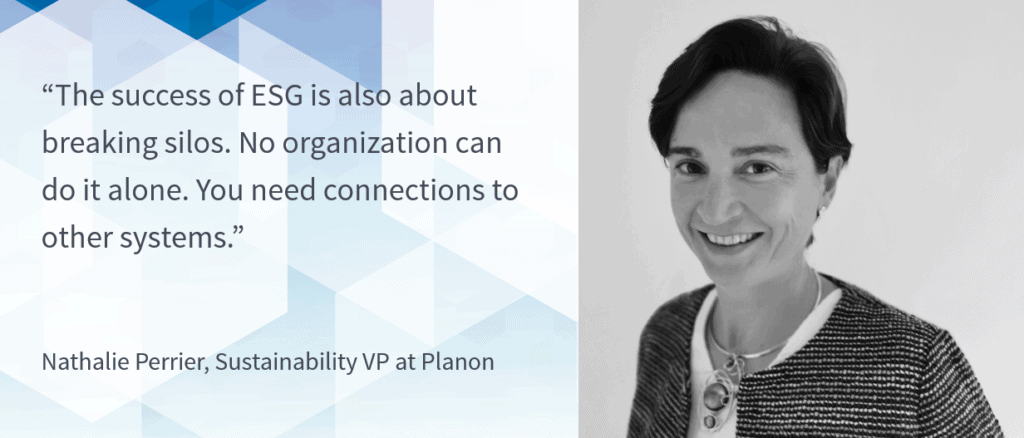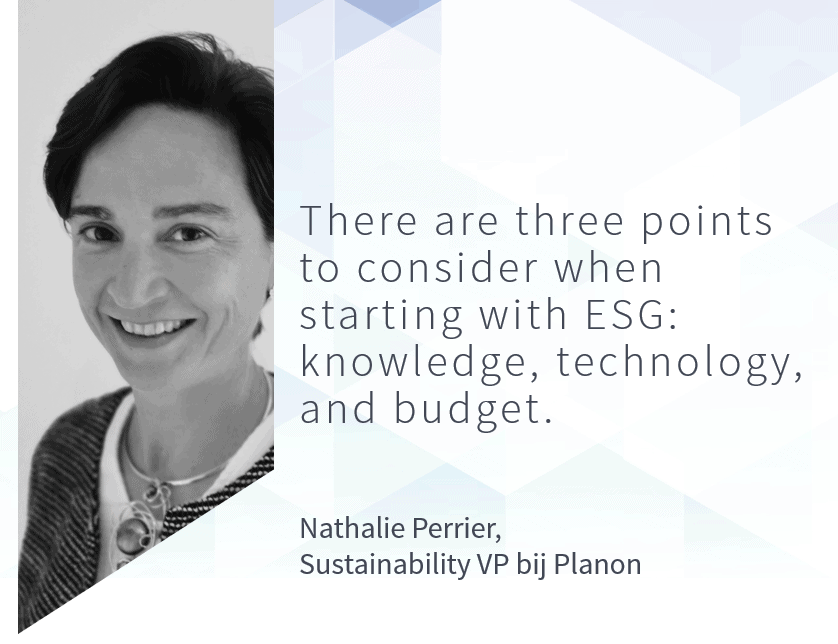Let's talk: Nathalie Perrier - ESG for real estate companies
ESG learnings
For real estate companies, ESG (Environment, Social & Governance) is increasingly a necessity. This is partly due to regulations, but also to stakeholders who attach value to ESG. That is why Reasult started an interview series with experts in this field. In this interview, we speak to Nathalie Perrier, Sustainability VP at Planon. What is the meaning of ESG for real estate organizations? What are the learnings so far, and how can we contribute to ESG? We ask expert Nathalie Perrier.

Nathalie Perrier – Sustainability VP Planon
Nathalie has been working for the past 16 years at Schneider Electric, a global leader in digital transformation of energy management and automation. Schneider Electric has had sustainability at the core of its strategy for the past 15 years and was named the world’s most sustainable company in 2021. In the context of the strategic partnership between Planon & Schneider Electric, Nathalie Perrier, as Vice President Sustainability at Planon since mid-2021, is leading the development of a joint strategic proposition for smart sustainable buildings but is also helping Planon reshape its ESG strategy & commitments as a company. Planon provides a software platform for real estate and facility management.
ESG is an important theme for both Planon and Schneider Electric. Nathalie notices that, fortunately, more and more organizations are starting to understand the importance of ESG. “I see a change emerging in recent months, real estate organizations feel the need and the pressure. That pressure comes from different angles, regulations, stakeholders, climate change effects, the energy crisis, you name it.” says Nathalie.
The importance of ESG for the real estate sector
For real estate developers, owners and investors alike, it is an important topic. Nathalie says: “If you know that 38% of CO2 emissions comes from buildings then the sector has an important role. For too long everyone looked at each other, but that is changing now and there are a lot of reasons for that. Not only does everyone feel more the urgency of climate change but also the carbon tax, regulations, returns and costs play a part. A good ESG strategy will save on operating costs but also give access to capital at a lower cost, premium rental prices and reduce the turnover of employees, therefore deliver a higher return.
Why do organizations choose ESG?
The choice for ESG varies from company to company. Some companies see it as brand strategy and employee retention, while others feel regulatory or stakeholder pressure. “For companies like Planon and Schneider Electric, it’s a conscious choice for sustainability and our social responsibility. That ambition to choose for our planet as well as for people is great. Attracting and retaining employees also plays a role in that. Schneider Electric started over 15 years ago both for sustainability reasons and also from a social point of view. We now know that it has many more benefits.
 So because we, at Schneider Electric, started that ESG journey many years ago not only are we able to reduce our impact on the planet through our E2E supply chain but, we are also very committed to having a positive impact on the society. As an example, being very conscious that 13% of the worldwide population has no access to electricity, we are helping communities around the globe to have access to energy because we do believe that it is a basic human right. You just must realize how much of an impact you can have as a company and then acting becomes an obvious thing to do.” says Nathalie.
So because we, at Schneider Electric, started that ESG journey many years ago not only are we able to reduce our impact on the planet through our E2E supply chain but, we are also very committed to having a positive impact on the society. As an example, being very conscious that 13% of the worldwide population has no access to electricity, we are helping communities around the globe to have access to energy because we do believe that it is a basic human right. You just must realize how much of an impact you can have as a company and then acting becomes an obvious thing to do.” says Nathalie.
How do you start with ESG?
ESG starts with a good strategy that fits your company. That sounds simple, but it is not. It is important that the vision and ambition fits your company and key stakeholders. “Start with a materiality assessment, which means to define the social and environmental topics that matter most to your business and your stakeholders. For this, you need to measure the risks & opportunities linked to these topics and the level of expectation of your stakeholders about it. It is not the same for every company. Do not look at just reducing energy consumption or Carbon emissions. Of course, you can make a difference in reducing consumption & emissions, but there are many more factors that can come into play. And it is an open door, but you have at least to start small because what is crucial is to start as soon as possible.” Says Nathalie.
What are the challenges when you start with ESG?
 There are three points to consider when starting with ESG, namely you need knowledge, technology, and budget. Nathalie explains it as follows: “First of all you need knowledge about ESG. If you do not have that in-house, then you need to get it. Either through a service provider or hire people yourself. There are more and more consultancies that can help you with this. Make sure ESG is not a management decision without the employees hooked up. At Schneider, there are as many as 60,000 employees who have an ESG score in their remuneration scheme. It also helps when you have a lot of young employees on staff because they have the mindset much more focused on sustainability and this helps you make the transition.
There are three points to consider when starting with ESG, namely you need knowledge, technology, and budget. Nathalie explains it as follows: “First of all you need knowledge about ESG. If you do not have that in-house, then you need to get it. Either through a service provider or hire people yourself. There are more and more consultancies that can help you with this. Make sure ESG is not a management decision without the employees hooked up. At Schneider, there are as many as 60,000 employees who have an ESG score in their remuneration scheme. It also helps when you have a lot of young employees on staff because they have the mindset much more focused on sustainability and this helps you make the transition.
The second point is technology and data. You need technology to improve ESG. Think about solar panels, measuring equipment or software to collect data, as well as building control systems to optimize your building. What you will measure is determined by the chosen strategy. There is not much point in collecting data without knowing what you are going to do with it.
Finally, budget. You need to make investments in skills, data, and technology. Fortunately, you see more and more opportunities to limit upfront investments because technology is more and more affordable and in addition, there are more and more companies offering ‘Solutions as a Service’. For example, they have solar panels installed on your property but instead of buying the equipment, you have a monthly fee instead to benefit from this solar energy. You can’t escape buying technology but the Return of investment will be there because indeed not have a net-zero strategy comes with a financial risk higher than the cost of addressing it.”
A successful route to ESG
The success of ESG depends on several factors and can vary greatly from company to company. Nathalie mentioned earlier that you can start small and that you need knowledge, technology, and data. “The success of ESG is also about breaking silos. No organization can do it alone, including Schneider Electric or Planon. You need connections to other systems.
Technology partner
Choose technology partners have openness and partnership in their DNA. That is also the advantage of the Planon platform because it easily connects to things like IOT, smart meters and various other apps. It can be very expensive to change technology, so choosing the right technology partner at the beginning to help you reach your ESG commitments is important. You can start small with that partner but then extend the capabilities over the time leveraging their ecosystem as well.”
ESG and regulations
“The success of ESG also depends on regulations. Some companies will not change their minds until they experience regulatory pressure. THE CSRD (Corporate Sustainability Reporting Directive) from the European Commission is going to require many companies to report on sustainability policies and performance. It will apply starting in January 2024 to companies meeting at least 2 out of the 3 following criteria: 250 employees+, €40M+ in turnover, €20M+ in total assets. This represents 49,000 companies in Europe, but the impact will be bigger because they must report their scope 3¹. So scope 3 means that their suppliers, even those that are not obliged to report within the CSRD, will have to assess and share their emissions. So CSRD will really drive a significant improvement when it comes to ESG.” says Nathalie.
¹ Scope 1 covers direct emissions that a company generates while performing its business activities, whereas scope 2 covers indirect missions from purchased energy, and scope 3 covers indirect emissions in the value chain.
